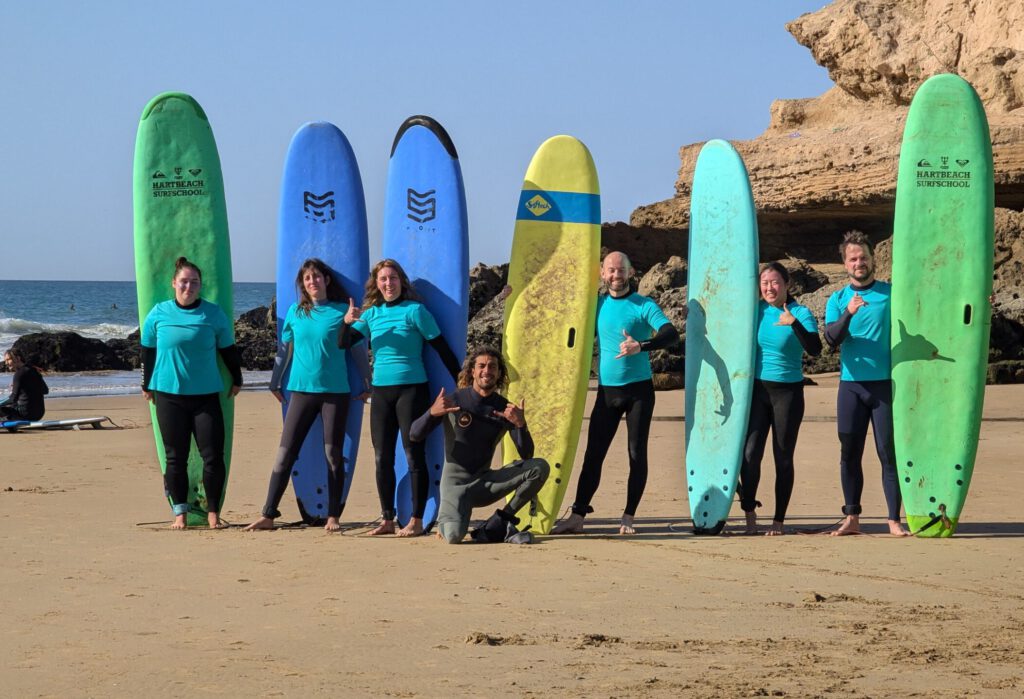Surfing in Portugal vs. Morocco: 8 Key Differences to Help You Choose Your Next Surf Trip
Are you trying to decide between a surf trip to Portugal or Morocco? Both destinations offer incredible waves, stunning coastlines, and vibrant surf cultures, but they have significant differences that can impact your experience.
In this guide, we’ll break down the 8 key differences between surfing in Portugal and surfing in Morocco so you can decide which destination best suits your style, skill level, and budget.
1. Surf Seasons and Best Time to Go
Portugal: Strong Winter Swells and Warmer Summers
Portugal experiences consistent waves year-round, but the best surf season is from September to April, when powerful Atlantic swells hit the coast. Summer (June–August) offers smaller waves, ideal for beginners. However, winter conditions can get heavy, especially in spots like Nazaré and Peniche.
Morocco: Year-Round Surf with Mild Winters
Morocco is a winter paradise for surfers, with warm temperatures and glassy, long point breaks from October to March. Unlike Portugal, Morocco’s winter is mild (20°C air temperature), and the water stays warmer, so you can surf in a 3/2mm wetsuit rather than the thicker 4/3mm required in Portugal during winter.
🌟 Winner for winter surfing: Morocco
🌟 Winner for summer surfing: Morocco
More details: Surf Seasons in Morocco
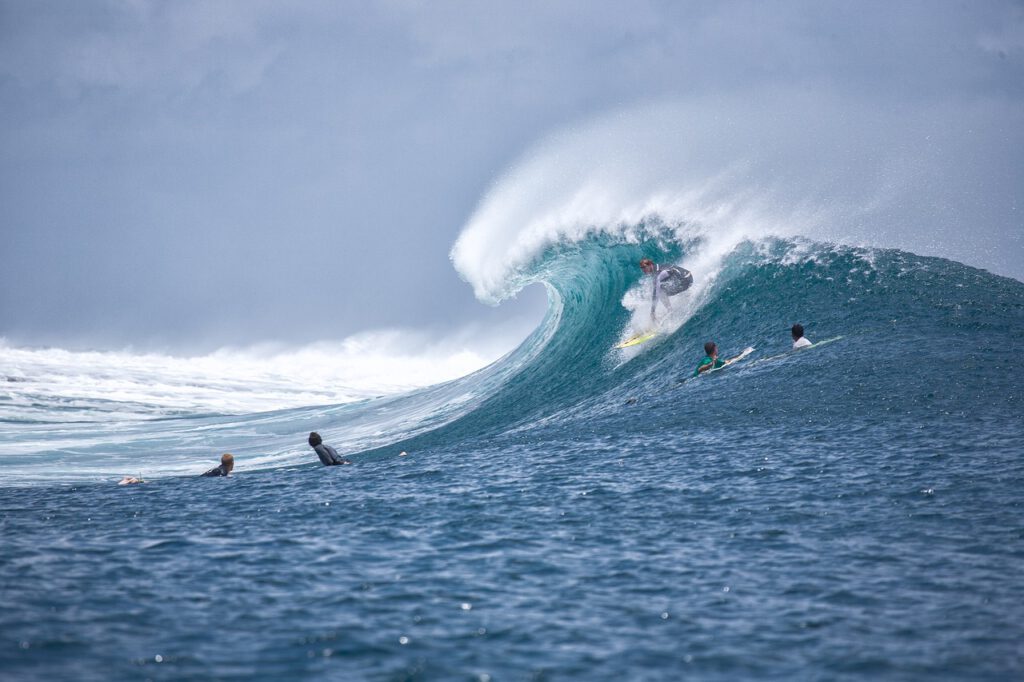
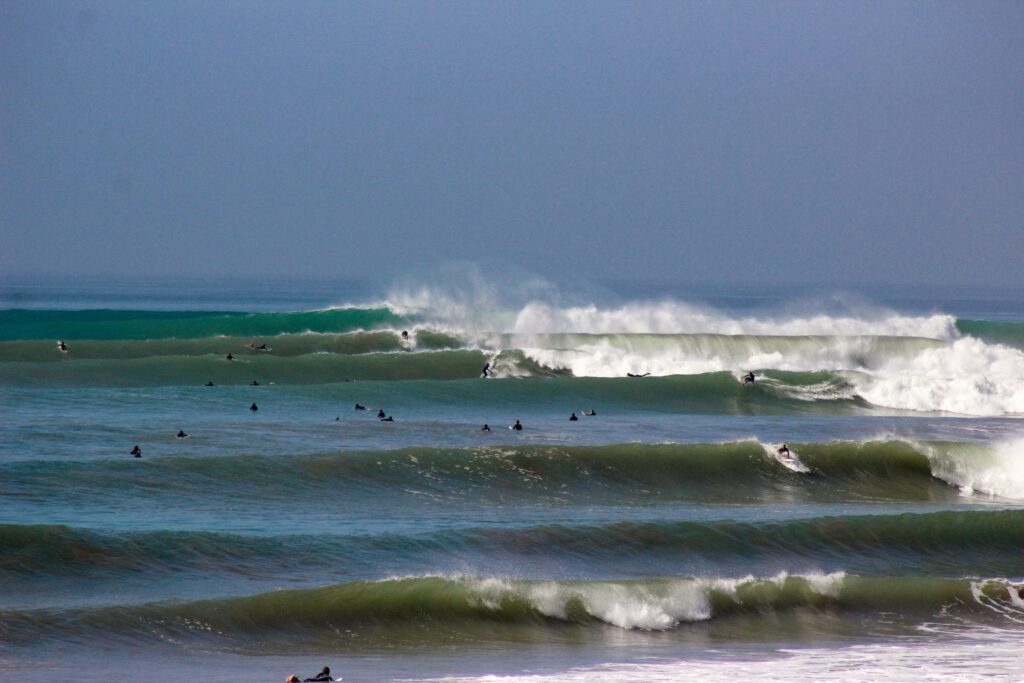
2. Surf Conditions: Waves for All Levels
Portugal: Powerful Beach Breaks and Reef Waves
Portugal is famous for its variety of surf spots, from beginner-friendly beach breaks in the Algarve to legendary big-wave spots like Nazaré and Supertubos. While some beaches offer softer waves for beginners, many breaks are fast, powerful, and challenging.
Morocco: Long, Perfect Right-Hand Point Breaks
Morocco’s coast is dotted with world-class right-hand point breaks, ideal for intermediate surfers looking to improve their skills. Spots like Anchor Point and Killer Point deliver long, clean rides, while beginner-friendly beaches like Crocro and Banana Beach offer forgiving waves.
🌟 Winner for beginner & intermediate surfers: Morocco
🌟 Winner for advanced surfers: Portugal
More details: Best Surf Spots in Morocco
3. Water Temperature and Wetsuit Needs
One of the key factors to consider when planning a surf trip is the water temperature and the type of wetsuit needed to stay comfortable in the water. The temperature of the ocean varies significantly between Portugal and Morocco, which affects the type of gear required for an enjoyable surf session.
Portugal: The water temperature in Portugal ranges between 14–20°C, depending on the season and location. During the winter months, when the waves are at their best, the ocean tends to be on the colder side, requiring surfers to wear a 4/3mm wetsuit to maintain body warmth. In the summer, the water temperature rises slightly, allowing surfers to switch to a 3/2mm wetsuit for better flexibility and comfort.
Morocco: Morocco enjoys warmer water temperatures, ranging from 16–22°C, making it a more inviting option for those who prefer surfing in milder conditions. During the winter months, when the famous right-hand point breaks come to life, a 3/2mm wetsuit is usually sufficient to keep warm in the water. In the hotter summer months, the temperature of the Atlantic Ocean along the Moroccan coast is warm enough to allow surfers to wear only boardshorts or a light wetsuit top, offering much greater comfort and ease of movement compared to Portugal.
Overall, Morocco provides a more comfortable surfing experience year-round in terms of water temperature, while Portugal requires surfers to adjust their wetsuit choice according to the season.
🌟 Winner: Morocco
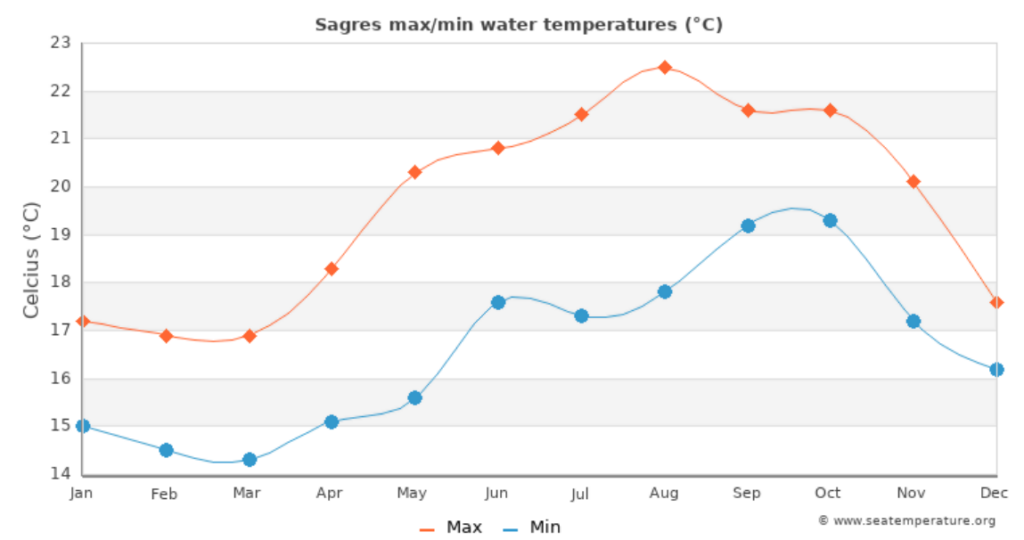
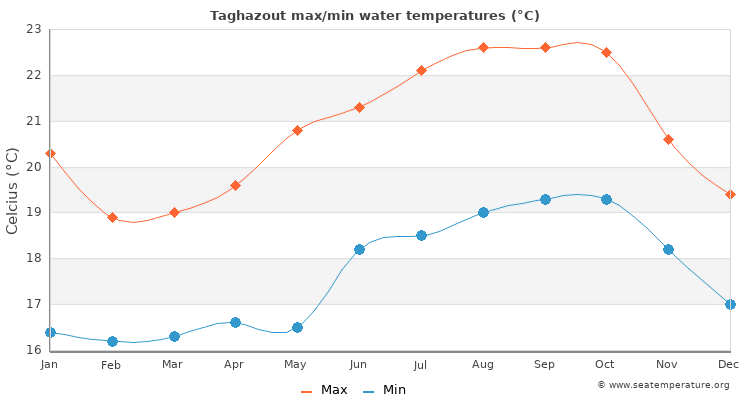
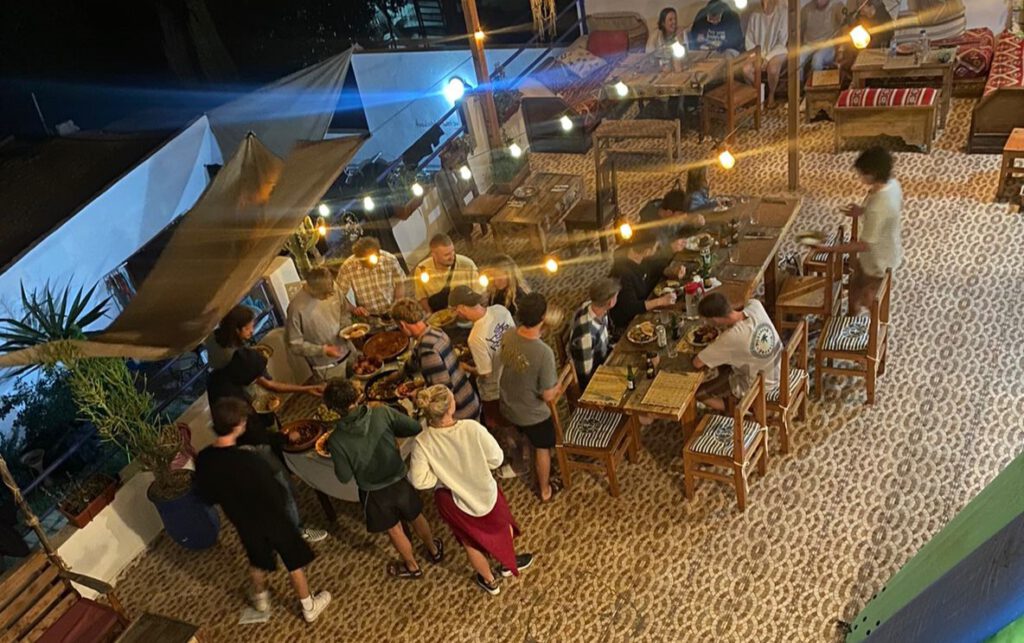
4. Surf Camp Experience: Where Will You Have the Best Stay?
Choosing the right surf camp is essential for ensuring an enjoyable and comfortable surf trip. Both Portugal and Morocco offer excellent surf camps catering to beginners and intermediates, but there are significant differences in what each destination provides in terms of accommodation, atmosphere, and additional experiences.
Portugal: Portugal boasts a wide range of surf camps, from budget-friendly hostels to high-end surf resorts. Many of these camps are situated in well-developed coastal towns such as Ericeira, Peniche, and the Algarve. Surf camps in Portugal often attract a diverse crowd of international travelers, creating a vibrant and social environment. The surf schools are well-established, with certified instructors offering structured lessons. Additionally, many surf camps in Portugal emphasize a balance between surfing and nightlife, with easy access to beachside bars and parties. However, during peak season, camps can be crowded, and prices for accommodation and lessons tend to be higher.
Morocco: Surf camps in Morocco provide a unique blend of surfing and cultural immersion. The most popular locations for surf camps include Taghazout, Tamraght, and Imsouane, where visitors can enjoy warm hospitality, traditional Moroccan cuisine, and a more relaxed atmosphere. Moroccan surf camps tend to be more affordable than those in Portugal, making them an excellent choice for budget-conscious travelers. Many surf camps in Morocco also offer additional experiences such as yoga sessions, cultural excursions, and desert trips, adding a distinct adventure aspect to the surf experience. Unlike Portugal, the social scene in Moroccan surf camps is generally more laid-back, focusing on community-building rather than nightlife. The waves are consistent, and fewer crowds make it easier for beginners and intermediates to progress in their surfing skills.
Accommodation and Pricing
Portugal: Surf camp prices range from €30–€80 per night, with premium options offering luxurious stays and added amenities.
Morocco: More budget-friendly, with surf camps ranging from €15–€60 per night, often including meals and excursions.
Atmosphere and Social Scene
Portugal: More structured surf camps with a strong social and nightlife scene.
Morocco: A more relaxed and culturally immersive experience, with a focus on surf progression and well-being.
Extra Activities
Portugal: Sightseeing, hiking, wine tasting, and nightlife.
Morocco: Yoga, souk visits, camel rides, and desert excursions.
🌟 Winner for budget travelers & cultural experience: Morocco
🌟 Winner for social scene & nightlife: Portugal
5. Cost Comparison: Which Destination is More Affordable?
Accommodation Costs
Portugal: €30–€80 per night, with budget hostels at the lower end and premium surf resorts on the higher end.
Morocco: €15–€60 per night, with affordable surf hostels and mid-range riads available.
Surf Lessons & Equipment Rental
Portugal: Surf lessons range from €40–€60 per session, with surfboard rentals at €10–€20 per day.
Morocco: Surf lessons are more budget-friendly, costing €30–€50 per session, with surfboard rentals at €5–€15 per day.
Food & Dining
Portugal: A complete meal in a mid-range restaurant costs €10–€20, while breakfast averages €5–€10.
Morocco: More affordable, with meals ranging from €5–€10 and breakfast from €2–€5.
Transportation Costs
Public Transport: Portugal: €1.50–€3 per ride / Morocco: €0.50–€1 per ride
Taxi (20 km): Portugal: €20–€30 / Morocco: €10–€20
Bus (20 km): Portugal: €3–€5 / Morocco: €2–€4
Car Rental per Day: Portugal: €25–€60 / Morocco: €20–€50
Additional Expenses
Tourist Attractions: Portugal: €5–€15 / Morocco: €1–€10
Laundry Service: Portugal: €5–€15 per load / Morocco: €3–€10 per load
Private Surf Photographer: Portugal: €50–€150 per session / Morocco: €30–€100 per session
Groceries:
Tomatoes (1 kg): Portugal: €1.13 / Morocco: €0.73
Water (1 liter): Portugal: €0.58 / Morocco: €0.35
Bananas (1 kg): Portugal: €0.97 / Morocco: €1.10
Eggs (10 pieces): Portugal: €1.18 / Morocco: €1.38
Overall Cost Verdict
Morocco is generally more affordable than Portugal across accommodation, food, transportation, and surf-related expenses, making it a great destination for budget-conscious surfers.
🌟 Winner: Morocco
Morocco is generally more affordable than Portugal for surfing, accommodation, food, and surf lessons.
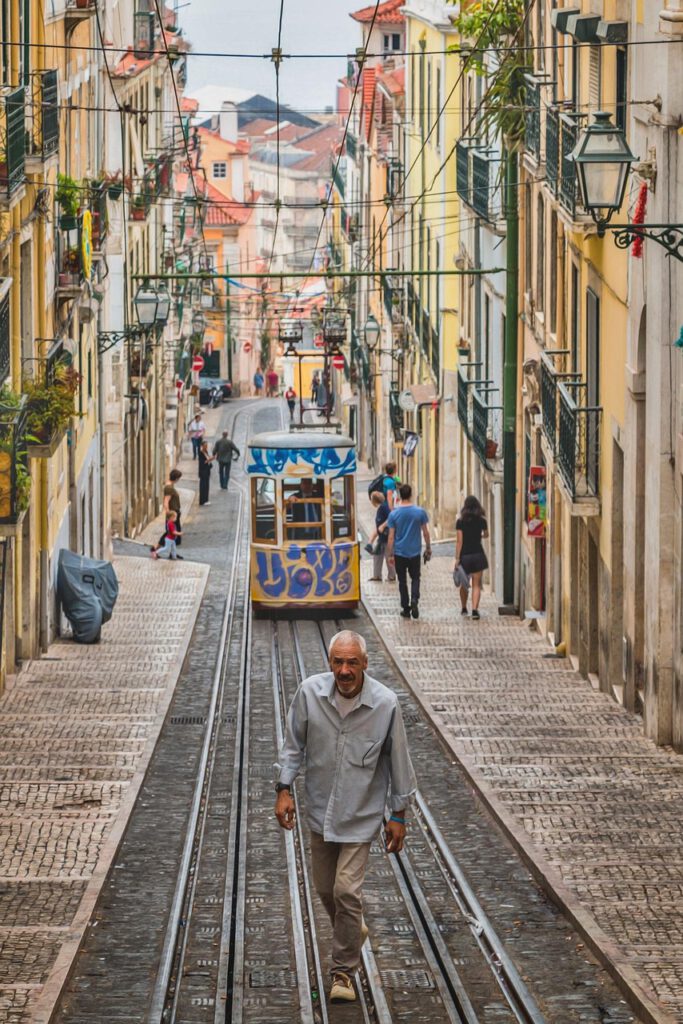
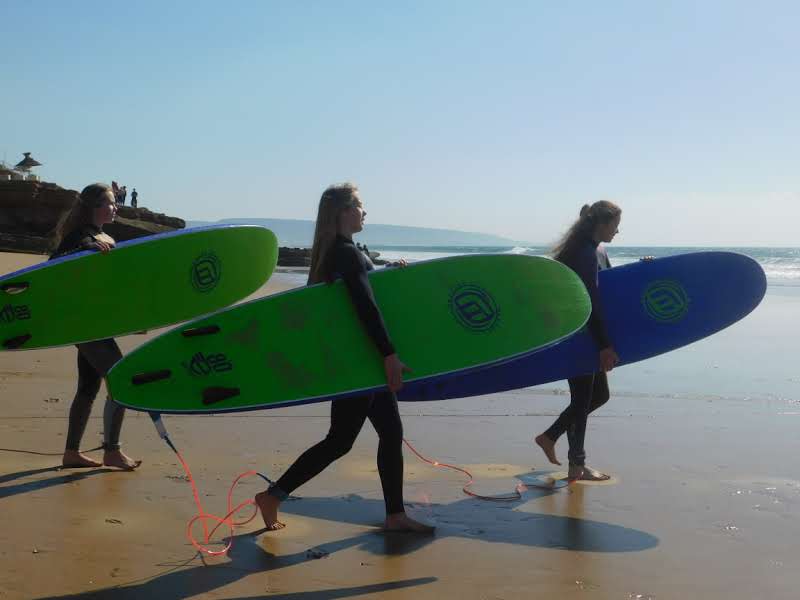
6. Crowds: Where Will You Find More Empty Waves?
When it comes to finding an uncrowded lineup, the difference between Portugal and Morocco is quite significant. The level of crowding at surf spots can greatly impact the quality of a surf session, especially for beginners and intermediates who need space to practice without the pressure of an overcrowded lineup.
Portugal: As one of Europe’s top surfing destinations, Portugal attracts thousands of surfers year-round, especially in the famous surf towns like Ericeira, Peniche, and the Algarve. During peak seasons, especially in summer, many of the more accessible and well-known surf breaks become extremely crowded. The combination of local surfers, traveling surf enthusiasts, and surf schools means that finding an empty wave can be a challenge. Advanced surfers may have to compete for waves at popular reef and point breaks, while beginners often deal with packed beach breaks where many surf schools operate. Although there are still some hidden gems along the Portuguese coastline, they usually require a long drive or a willingness to explore more remote locations.
Morocco: Compared to Portugal, Morocco offers a much higher chance of finding empty or less crowded waves, particularly in off-peak months. While Taghazout and Anchor Point can get busy during the prime winter swell season, the overall crowd density remains lower than in Portugal. Additionally, Morocco’s long right-hand point breaks allow surfers to spread out more, reducing the competitiveness in the lineup. For those willing to explore beyond the most famous surf towns, there are plenty of hidden surf spots along Morocco’s expansive coastline where you can enjoy perfect waves with minimal crowds. Even during peak surf season, lesser-known spots near Agadir and Imsouane provide excellent conditions without the overwhelming numbers found at Portugal’s hotspots.
Where Will You Find More Space in the Lineup?
Portugal: Popular breaks can be overcrowded, particularly in summer, making it challenging for beginners and intermediates to find space.
Morocco: While some famous spots get busy in winter, it is much easier to find uncrowded waves and hidden surf gems along the coastline.
🌟 Winner for fewer crowds and more open waves: Morocco
7. Accessibility: Which Destination is Easier to Travel To?
When planning a surf trip, accessibility plays a crucial role in deciding which destination is the most convenient. Both Portugal and Morocco have well-developed international travel connections, but there are key differences in transport infrastructure, ease of movement within the country, and travel convenience.
Portugal: Portugal is one of the most accessible surf destinations in Europe, with major international airports in Lisbon, Porto, and Faro, offering frequent direct flights from Europe, North America, and other global locations. Once in Portugal, the country’s public transport system is highly efficient, with reliable train and bus networks connecting key surf regions such as Ericeira, Peniche, and the Algarve. Renting a car is also a viable option, with well-maintained roads and clear signage making it easy to explore the coastline and discover hidden surf spots.
Morocco: Morocco’s main surf hubs, including Taghazout and Tamraght, are primarily accessed via Agadir-Al Massira Airport, which has direct flights from various European cities. Marrakech is another major entry point, with a broader range of international connections. From these airports, surfers need to take a 1-4 hour drive to reach the best surf destinations. While public transport in Morocco is less developed compared to Portugal, shared taxis, private transfers, and car rentals make it relatively easy to move between locations. However, some remote surf spots require a 4×4 vehicle or a guided trip due to less-developed roads.
Ease of Travel & Internal Transport
Portugal: Well-developed train and bus networks connect major surf towns, making it easy to travel without a car.
Morocco: More reliant on taxis, private transfers, and car rentals, as public transport does not directly serve many surf spots.
Flight Availability & Travel Convenience
Portugal: Multiple international airports with extensive flight options, providing direct access to surf regions.
Morocco: Limited to major entry points (Agadir and Marrakech), requiring additional ground transport to surf towns.
Infrastructure & Road Conditions
Portugal: Modern highways and well-maintained roads make road trips and surf exploration easy.
Morocco: Some coastal roads are less developed, particularly for accessing more remote surf spots.
Overall, Portugal offers greater accessibility and ease of travel, with better public transport options and more direct flight connections, while Morocco requires a bit more planning for internal travel but is still a convenient destination, particularly for European travelers.
🌟 Winner for easy travel: Portugal
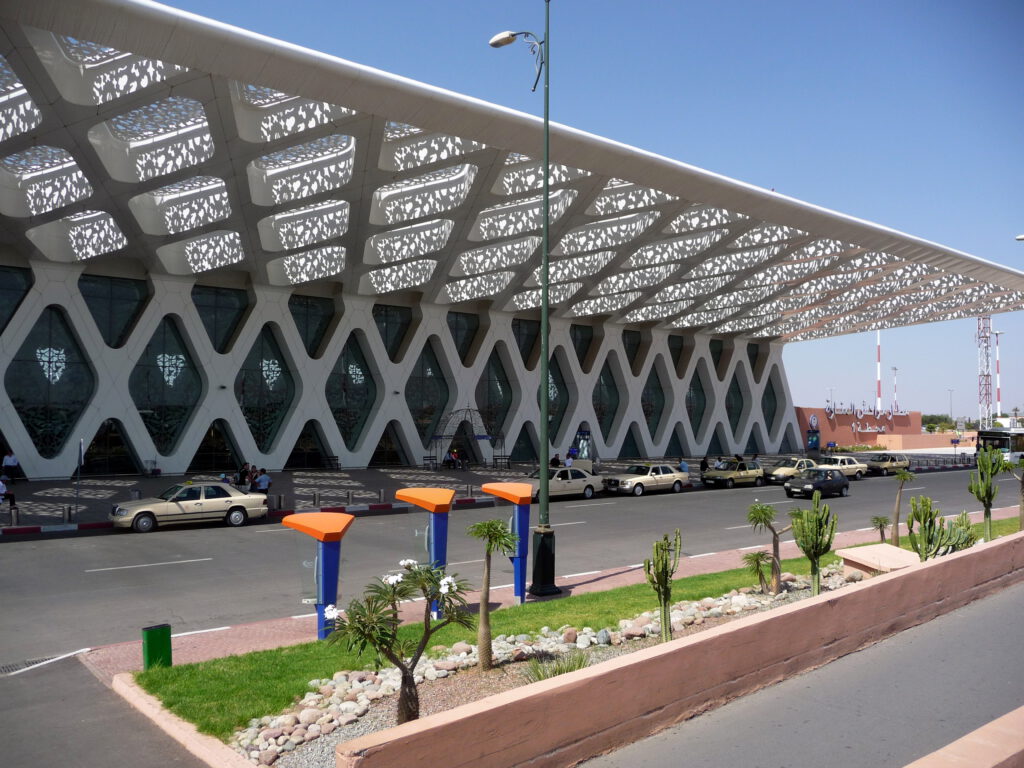
8. Cultural Experience: A European vs. Exotic Adventure
Experiencing the local culture is an essential part of any surf trip, and both Portugal and Morocco offer unique experiences that can enhance your time outside the water. From food and traditions to social interactions and lifestyle, these two destinations differ significantly, providing contrasting yet equally enriching adventures for traveling surfers.
Portugal: Portugal is steeped in European history, with a strong maritime heritage and a vibrant modern surf culture. Surf towns like Ericeira, Peniche, and Lagos have a well-established surf scene that blends seamlessly with Portugal’s broader cultural elements. Travelers can experience historic architecture, cobblestone streets, and charming coastal villages, all while enjoying the relaxed surf lifestyle. Portuguese cuisine is another highlight, with an emphasis on fresh seafood, hearty stews, and local delicacies like grilled sardines and the iconic pastel de nata. Beyond surfing, visitors can explore historic sites such as Belém Tower, the colorful streets of Sintra, and the ancient castles of Óbidos. The social scene is also lively, with beach bars, nightclubs, and a rich café culture where locals and travelers mingle.
Morocco: Morocco offers an exotic and immersive cultural experience that is quite different from Portugal’s European setting. Surfing in Morocco means diving into a rich blend of Arabic, Berber, and French influences, where the surf towns maintain a relaxed, welcoming atmosphere. Taghazout, Tamraght, and Imsouane are the most popular surf hubs, offering a unique mix of surf culture and traditional Moroccan hospitality. Visitors can explore bustling souks, try authentic Moroccan dishes like tagines and couscous, and sip fresh mint tea in traditional riads. Unlike Portugal, where alcohol is readily available, nightlife in Morocco is more subdued, with surf camps and guesthouses often organizing communal dinners, bonfires, and live music. Additionally, Morocco’s landscapes are diverse, offering desert excursions, camel rides, and trips to the stunning Atlas Mountains for those looking to add more adventure to their surf holiday.
Cultural Immersion and Atmosphere
Portugal: A European surf destination with a well-integrated surf community, historic landmarks, and vibrant nightlife.
Morocco: A deeply immersive cultural experience with traditional markets, Moroccan hospitality, and stunning natural scenery.
Food and Cuisine
Portugal: A mix of fresh seafood, local pastries, and Mediterranean flavors. Must-try dishes include grilled fish, caldo verde (green soup), and bifana (pork sandwich).
Morocco: Aromatic and spice-infused dishes such as lamb tagine, harira soup, and seafood pastilla. Fresh fruit juices and mint tea are also an essential part of Moroccan cuisine.
Non-Surf Activities
Portugal: Hiking, wine tasting, exploring medieval towns, visiting UNESCO World Heritage sites, and enjoying vibrant nightlife.
Morocco: Desert excursions, camel trekking, visiting ancient medinas, hammam spa experiences, and cultural workshops.
Social Life and Nightlife
Portugal: Known for its lively social scene, Portugal offers a mix of beach bars, music festivals, and clubbing in Lisbon, Porto, and the Algarve.
Morocco: A more relaxed and intimate atmosphere, with surf camps hosting dinners, live music nights, and community-driven experiences.
If you’re looking for an adventure-packed, culturally rich surf holiday, Morocco offers a more exotic and immersive experience, blending waves with a unique North African charm. However, if you prefer a familiar European setting with modern amenities, historical sites, and a lively surf culture, Portugal may be the best option for you.
🌟 Winner for cultural experience: Morocco
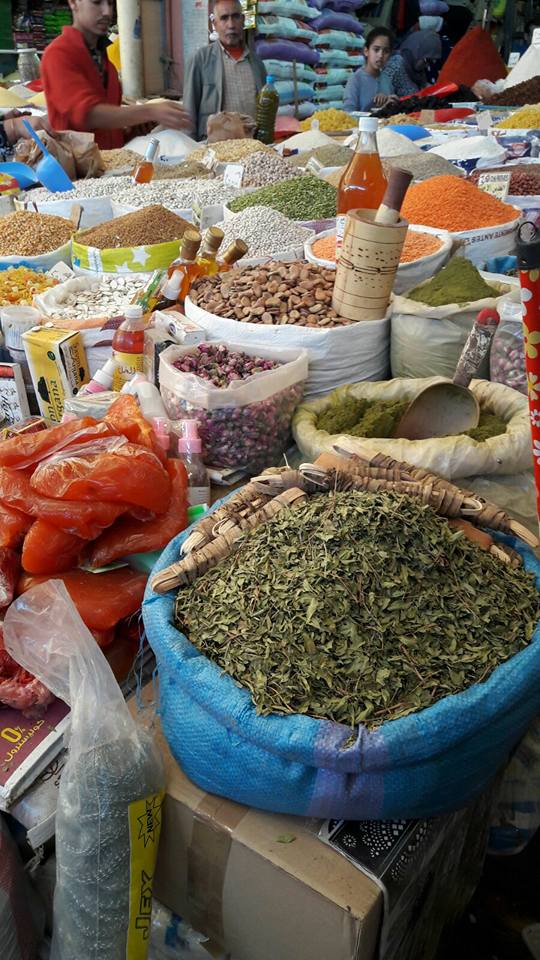
Final Verdict: Which Destination is Right for You?
After comparing all the key aspects of surfing in Portugal and Morocco, it is clear that both destinations offer incredible experiences, but they cater to different types of surfers depending on their preferences, budget, and travel style. Whether you are looking for year-round warm waves, an exotic adventure, or a European surf experience with a lively nightlife, your choice will depend on what you value most in a surf trip.
Who Should Choose Portugal?
If you prefer a well-developed surf scene, structured surf camps, easy accessibility, and lively nightlife, Portugal is the perfect option. With its powerful Atlantic swells, famous surf competitions, and a well-established surf tourism industry, Portugal is a great choice for those who want high-quality waves with modern comforts. Additionally, Portugal is ideal for advanced surfers looking for challenging reef and beach breaks, as well as travelers who enjoy European culture, historic sites, and nightlife.
Who Should Choose Morocco?
If you’re searching for a budget-friendly surf trip, warm water, uncrowded waves, and a culturally immersive experience, Morocco is an excellent destination. Morocco provides an authentic adventure with long right-hand point breaks, relaxed surf camps, and affordable prices. Whether you are a beginner, intermediate, or even an experienced surfer looking for consistent waves in a more laid-back atmosphere, Morocco offers less crowded surf spots, rich cultural experiences, and the perfect balance of adventure and relaxation.
Portugal vs. Morocco: Key Feature Comparison
| Feature | Winner |
|---|---|
| Best for Winter Surfing | 🇲🇦 Morocco |
| Best for Summer Surfing | 🇲🇦 Morocco |
| Best for Beginners | 🇲🇦 Morocco |
| Best for Advanced Surfers | 🇵🇹 Portugal |
| Cheapest Destination | 🇲🇦 Morocco |
| Best for Culture & Adventure | 🇲🇦 Morocco |
| Best for Nightlife & Social Scene | 🇵🇹 Portugal |
| Easiest to Travel To | 🇵🇹 Portugal |
Book Your Ultimate Surf Holiday in Morocco!
Are you ready to experience warm waves, fewer crowds, and an unforgettable adventure? Join us for a surf holiday in Morocco and improve your skills while enjoying stunning landscapes and rich local culture. Whether you’re a beginner looking to catch your first wave or an experienced surfer looking for the perfect right-hand point break, Morocco has something for everyone.
🌊 Check out our all-inclusive surf holiday packages here: Surf Holiday in Morocco
See you in the lineup! 🤙
